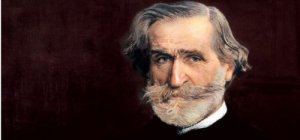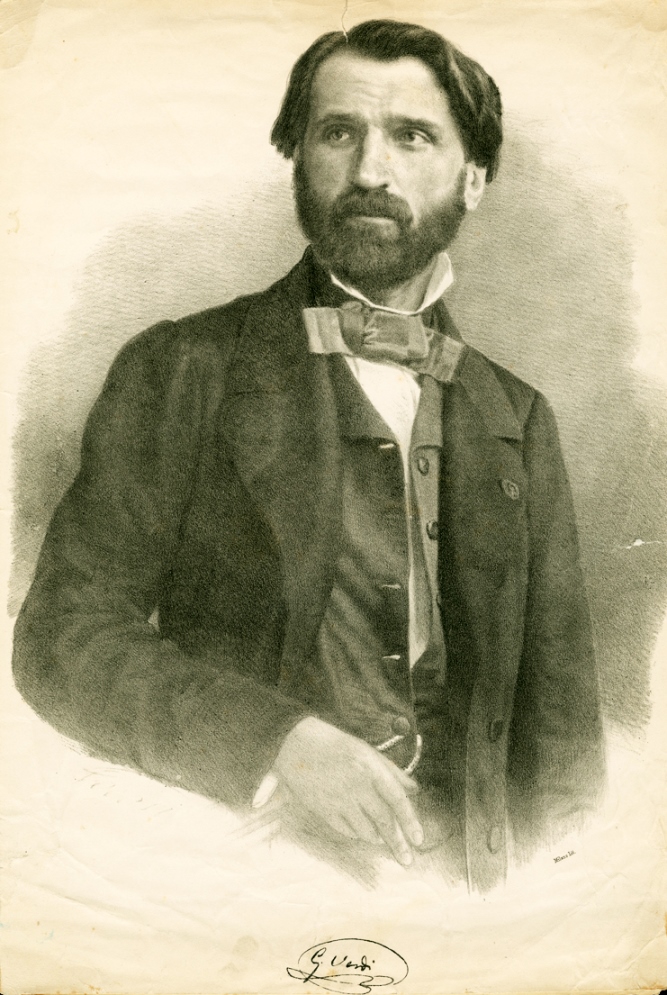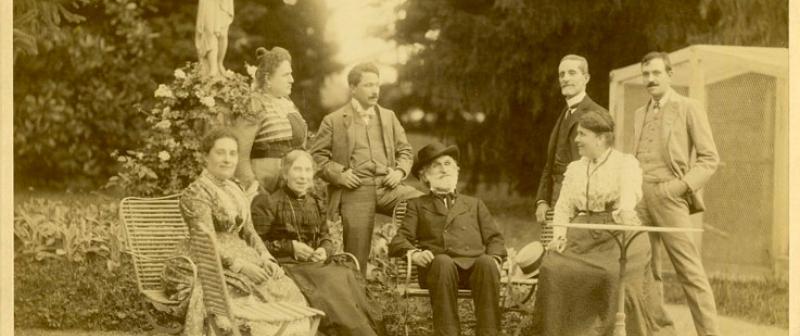Giuseppe Verdi: The Patriotic Composer


Reviewed and approved by the psychologist Gema Sánchez Cuevas
Giuseppe Verdi was the composer of the masses. He thought of his country and its people when he composed and his music shows humanity’s passion and portrays emotions such as love, hate, jealousy, and fear.
“You may have the universe if I may have Italy.”
-Giuseppe Verdi-
Verdi, through his music, worked for his country’s unification. A true nationalist, his operas were, and still are, a vessel of pride for the Italian people.
Giuseppe Verdi’s Childhood
Giuseppe Verdi was born on October 10, 1813, in Parma. He was born into a very humble family. His father, Giuseppe, was an innkeeper, and his mother, Luisa, a seamstress.
When he turned eight, Giuseppe started to show an interest in music, which is why his father gave him a spinet made especially for him. A child prodigy, Giuseppe was discovered by Antonio Barezzi, who later became his guardian.
When he turned twelve, Verdi moved to Busseto to live with Barezzi. He took care of his education and gave him the best musical training. During this time, he met Fernando Provesi.

As a Young Adult
Just after turning 18, Verdi moved to Milan and tried to study in the city’s conservatory, but they believed he was too old to study there. Also, Verdi’s piano playing technique was kind of strange for them. Funnily enough, that same conservatory is named after him now.
Then, in 1836, at the age of 23, Verdi married Marguerita Barezzi, his guardian’s daughter. They had two children, who died at a very early age. During this time, Verdi was working in his opera prima, Oberto.
The couple made arrangements to play Oberto in the Scala. The opera was successful and had 14 runs. After this, Verdi signed a contract with the theater to premiere three more of his works.
Margherita passed away on June 18, 1840, due to encephalitis. She was 26 years old. Verdi was crushed but had to keep on working. During this time, he wrote Un giorno di regno, a comedy. The opera premiere on September 5th, 1840, and was an absolute flop. Heartbroken, Verdi even considered quitting.
Heartbroken
Italy had become a broken country, which led Verdi to compose Nabucco. The opera premiered in La Scala in 1842 and was an incredible success. People flocked to the theater and really connected with Verdi’s drama.
Nabucco was Verdi’s vindication in Milan, both as a composer and as an icon for the Italian unification efforts. People even considered his “Va, pensiero” a resistance anthem.

Verdi’s First Masterpieces and Final Works
His first magnum opus, Rigoletto, premiered in 1851. Il trovatore and La traviata came two years later. Verdi kept pushing his boundaries as a composer and produced works such as Aida (1871). This opera is more harmonious than his previous work. You hear shorter but better-integrated arias, and more cohesive movements.
From this moment on, Verdi slowly stopped composing after creating two of his last masterpieces: Otello and Falstaff.
The Death and Legacy of Giuseppe Verdi
During his final years, Verdi lived a quiet life and dedicated himself to the countryside. While traveling to Milan, Verdi suffered a stroke and died on January 27th, 1901. His death shocked the country and the musical community.
Before his death, Verdi founded a home for retired and homeless musicians called la Casa di Riposo per Musicisti. He left all his fortune to this house and, following his wishes, was interred there next to his second wife, Giuseppina, who died in 1897. Today, this home cares for elderly musicians.
Few musicians and composers have been able to translate their political philosophy into music as Verdi did. The public loved his work, which is why he was so successful.
Verdi’s unique because he used music to bring people together. Many criticized his operas because he talked about suicide, rape, and free love. Nonetheless, Verdi overcame many hardships and made music on his own terms.
Giuseppe Verdi was the composer of the masses. He thought of his country and its people when he composed and his music shows humanity’s passion and portrays emotions such as love, hate, jealousy, and fear.
“You may have the universe if I may have Italy.”
-Giuseppe Verdi-
Verdi, through his music, worked for his country’s unification. A true nationalist, his operas were, and still are, a vessel of pride for the Italian people.
Giuseppe Verdi’s Childhood
Giuseppe Verdi was born on October 10, 1813, in Parma. He was born into a very humble family. His father, Giuseppe, was an innkeeper, and his mother, Luisa, a seamstress.
When he turned eight, Giuseppe started to show an interest in music, which is why his father gave him a spinet made especially for him. A child prodigy, Giuseppe was discovered by Antonio Barezzi, who later became his guardian.
When he turned twelve, Verdi moved to Busseto to live with Barezzi. He took care of his education and gave him the best musical training. During this time, he met Fernando Provesi.

As a Young Adult
Just after turning 18, Verdi moved to Milan and tried to study in the city’s conservatory, but they believed he was too old to study there. Also, Verdi’s piano playing technique was kind of strange for them. Funnily enough, that same conservatory is named after him now.
Then, in 1836, at the age of 23, Verdi married Marguerita Barezzi, his guardian’s daughter. They had two children, who died at a very early age. During this time, Verdi was working in his opera prima, Oberto.
The couple made arrangements to play Oberto in the Scala. The opera was successful and had 14 runs. After this, Verdi signed a contract with the theater to premiere three more of his works.
Margherita passed away on June 18, 1840, due to encephalitis. She was 26 years old. Verdi was crushed but had to keep on working. During this time, he wrote Un giorno di regno, a comedy. The opera premiere on September 5th, 1840, and was an absolute flop. Heartbroken, Verdi even considered quitting.
Heartbroken
Italy had become a broken country, which led Verdi to compose Nabucco. The opera premiered in La Scala in 1842 and was an incredible success. People flocked to the theater and really connected with Verdi’s drama.
Nabucco was Verdi’s vindication in Milan, both as a composer and as an icon for the Italian unification efforts. People even considered his “Va, pensiero” a resistance anthem.

Verdi’s First Masterpieces and Final Works
His first magnum opus, Rigoletto, premiered in 1851. Il trovatore and La traviata came two years later. Verdi kept pushing his boundaries as a composer and produced works such as Aida (1871). This opera is more harmonious than his previous work. You hear shorter but better-integrated arias, and more cohesive movements.
From this moment on, Verdi slowly stopped composing after creating two of his last masterpieces: Otello and Falstaff.
The Death and Legacy of Giuseppe Verdi
During his final years, Verdi lived a quiet life and dedicated himself to the countryside. While traveling to Milan, Verdi suffered a stroke and died on January 27th, 1901. His death shocked the country and the musical community.
Before his death, Verdi founded a home for retired and homeless musicians called la Casa di Riposo per Musicisti. He left all his fortune to this house and, following his wishes, was interred there next to his second wife, Giuseppina, who died in 1897. Today, this home cares for elderly musicians.
Few musicians and composers have been able to translate their political philosophy into music as Verdi did. The public loved his work, which is why he was so successful.
Verdi’s unique because he used music to bring people together. Many criticized his operas because he talked about suicide, rape, and free love. Nonetheless, Verdi overcame many hardships and made music on his own terms.
All cited sources were thoroughly reviewed by our team to ensure their quality, reliability, currency, and validity. The bibliography of this article was considered reliable and of academic or scientific accuracy.
- Mila, M., de Aranda, C. G. P., & Tamargo, C. S. (1992). El arte de Verdi. Alianza.
- Southwell-Sander, P. (2001). Giuseppe Verdi. Ediciones Robinbook.
This text is provided for informational purposes only and does not replace consultation with a professional. If in doubt, consult your specialist.







